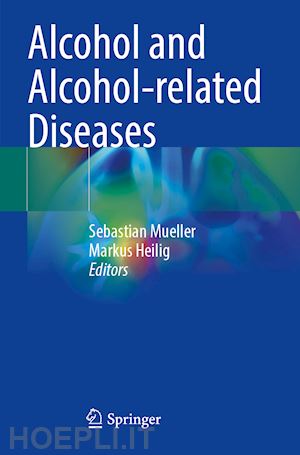

Questo prodotto usufruisce delle SPEDIZIONI GRATIS
selezionando l'opzione Corriere Veloce in fase di ordine.
Pagabile anche con Carta della cultura giovani e del merito, 18App Bonus Cultura e Carta del Docente
Alcohol is one of the major risk factors for negative health outcomes worldwide. It accounts for more than 60 alcohol-related diseases, ranging from addiction, through liver cirrhosis, to cancer. Collectively, these conditions account for mortality and morbidity that make alcohol use one of the leading preventable causes of disability adjusted life-years (DALYs) lost globally. In this book, an international faculty covers all aspects of alcohol-related disorders, ranging from addiction/alcohol use disorders (AUD) to alcohol-related diseases of other organs such as liver, heart or cancer. A special focus is to reach out to primary care physicians who are in the front line of this major health problem. The book also provides an update for addiction specialists, as well as specialists in internal medicine, gastroenterology and hepatology. The book is divided into sections that include epidemiology, alcohol use disorders and addiction, alcohol-related liver disease, alcoholic hepatitis,primary care and interdisciplinary approaches and other alcohol-related diseases. Besides current diagnostic measures and treatment strategies, the book deals with the many underlying molecular and genetic mechanisms of alcohol toxicity. Novel insights include prospective data on all-cause mortality and the emerging major role of alcohol-mediated hemolysis and enhanced red blood cell turnover. The book also aims at guiding policy makers to handle the topic of alcohol in our society more responsibly.
Sebastian Mueller is Professor of Medicine and the current Director of the Center for Alcohol Research at the University of Heidelberg. He studied medicine in Leipzig, Denver and Strasbourg and obtained a PhD in Biophysics. He was gastroenterology resident and consultant in Heidelberg, postdoctoral Humboldt fellow at USC in Los Angeles and lecturer at the BIDMC/Harvard Medical School from 2005-2007. For the last 15 years, he has served as Vice Head of the Department of Internal Medicine at Salem Medical Center in Heidelberg. Professor Mueller’s translational research includes the pathophysiology, genetics, diagnosis and treatment of liver diseases, namely alcoholic liver disease. His long-term basic research interests focus on hepatic iron metabolism and redox regulation, with continuous funding from the DFG, NIH and others. He has published more than 200 original articles and, among others, the first book on Liver elastography which addresses the non-invasive assessment of liver fibrosis. From 2017-2021, he was President of the European Society of Biomedical Research on Alcoholism (ESBRA). Prof. Mueller also holds guest professor positions at the Institute of Hepatology in London and in Nanning, PR China. He regularly sees liver patients at VISCERA/Hirslanden in Bern, Switzerland.
Markus Heilig is Vice-Chancellor’s Professor of Psychiatry and Director of the Center for Social and Affective Neuroscience at Linköping University, Sweden. He received his MD and PhD from Sweden’s Lund University, and was a post-doctoral fellow with Dr. George Koob at the Scripps Research Institute, La Jolla, CA. Prior to his current appointment, Heilig served in various clinical and academic leadership positions at the Karolinska Institute, Stockholm (1995 – 2004), and as Director of intramural cl^300 papers, and received numerous awards, including the European Neuropsychopharmacology Award and the Swedish Söderberg Award. He is an elected member of the Swedish Royal Academy of Sciences, and a Wallenberg Clinical Scholar.











Il sito utilizza cookie ed altri strumenti di tracciamento che raccolgono informazioni dal dispositivo dell’utente. Oltre ai cookie tecnici ed analitici aggregati, strettamente necessari per il funzionamento di questo sito web, previo consenso dell’utente possono essere installati cookie di profilazione e marketing e cookie dei social media. Cliccando su “Accetto tutti i cookie” saranno attivate tutte le categorie di cookie. Per accettare solo deterninate categorie di cookie, cliccare invece su “Impostazioni cookie”. Chiudendo il banner o continuando a navigare saranno installati solo cookie tecnici. Per maggiori dettagli, consultare la Cookie Policy.